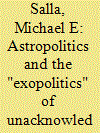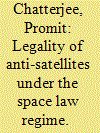| Srl | Item |
| 1 |
ID:
130048


|
|
|
|
|
| Publication |
2014.
|
| Summary/Abstract |
The role of unacknowledged classified programs remains an enigma for fully understanding activities in space and the study of astropolitics. Classified programs by law are not publicly announced, and remain inaccessible to all except those with valid security clearances to be briefed about them. In the United States, waived Unacknowledged Special Access Programs are the most highly classified programs conducted by the military and intelligence community. The same classification protocols are also required of private contractors working with U.S. military departments and intelligence agencies on classified programs. As space continues to grow in its national security significance, the number of these unacknowledged programs pertaining to space is likely to grow significantly from its current number. This requires adopting the necessary conceptual tools and methodological flexibility for investigating unacknowledged activities in space. This also extends to evidence concerning unidentified flying objects and extraterrestrial life. This article suggests that "exopolitics" is a unique multidisciplinary approach to extraterrestrial life that offers a helpful set of conceptual tools for studying unacknowledged space activities, and complements the field of astropolitics.
|
|
|
|
|
|
|
|
|
|
|
|
|
|
|
|
| 2 |
ID:
130043


|
|
|
|
|
| Publication |
2014.
|
| Summary/Abstract |
The term anti-satellite, or in short ASAT, is used to refer to a system designed to destroy or damage satellites. The heightened tendency among the spacefaring nations to develop ASAT technology in the recent past has led to widespread debates as to the legality of ASAT deployment under the space law regime. In this context, I have endeavored to make a detailed analysis of the international legal provisions to find if there is any legal basis at all for the deployment of such ASATs. I have concluded that none of the existing legal provisions in space law, as well as public international law, have sufficient force and clarity to bring about a blanket ban on ASAT weapons. Therefore, the research suggests a slew of reforms to overcome this anomaly. Examples of such proposed reforms include, inter alia, an amendment of the Outer Space Treaty and an enhanced role and influence of the United Nations in treaty making coupled with active diplomatic initiatives.
|
|
|
|
|
|
|
|
|
|
|
|
|
|
|
|